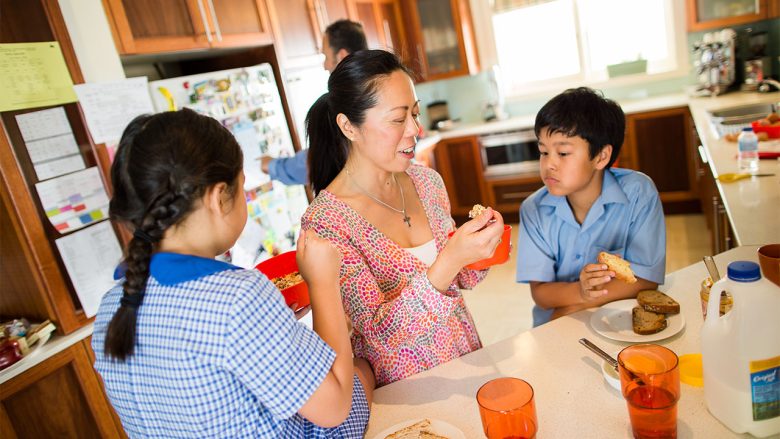Setting a good tone for the day with a planned morning routine can help kids be ready and focused for school.
Advantages of Sticking to a Routine
For kids, consistency makes them feel safe and sure of what will happen next. This lets them know what to expect and calms things down in the morning, making it easier to get things done.
Setting a Time to Wake Up
Set an alarm that goes off at a time that lets you do all of your morning tasks without being rushed. Your child should have time for a good breakfast and a calm start to the day.
Ideas for a healthy breakfast
A healthy breakfast gives your body and mind the power they need for the day. Muesli with fruit, whole-grain toast with butter or yoghurt with muesli and berries are all healthy meals that you can choose.
Getting ready for school
Making sure that kids are ready for school is important for getting them off to a good start.
Putting school supplies in order
The night before, help your kid put their school items away. Make sure their rucksack has all the things they will need, like notes, writing tools and textbooks.
Getting Lunch Ready
Make lunches that are balanced and healthy by adding fruits, veggies, meats, and whole grains. To get your child to make better choices, get them involved in the process.
Looking over homework
Check your child’s schoolwork to make sure it is full and correct. This helps them remember what they’ve learned and gets them ready for the lessons the next day.
Getting People to Study Well
To do well in school, you need to have good work skills. Help your kid get into these habits as soon as possible.
Making a Plan to Study
A study plan helps kids make good use of their time. Set aside time for homework, studying, and fun to make sure you have a healthy schedule.
How to Find a Quiet Place to Study
Focus and productivity can be improved by having a designated, quiet area that is free of distractions. Make sure this area is well-lit and has all the tools it needs.
Techniques for Managing Your Time
Teach your child how to handle their time by showing them how to do things like the Pomodoro method, which has them work for 25 minutes and then take a 5-minute break. This can help you focus and keep you from getting burned out.
Keeping up with extracurricular activities
Extracurricular hobbies are good for your growth as a person, but they need to be matched with schoolwork.
Picking the Right Things to Do
Choose things to do with your child that are fun and build on their skills. Make sure they don’t take on too much, as this can cause stress and burnout.
Why downtime is important
Time to relax is important for both mental and physical healing. Make sure your child has time to do things they enjoy without being told what to do.
Taking Care of Promises
Help your child set priorities for their responsibilities and interests. To keep their plans from getting too full, teach them how to handle schoolwork and recreational activities.
Getting people to eat healthier
Eating well is important for both physical and mental growth.
Ideas for Healthy Snacks
Encourage healthy snacks like yoghurt, fruits, veggies, nuts, and seeds. These give you steady energy and nutrients your body needs to grow.
How Important It Is to Hydrate
Make sure that your kid gets enough water every day. Being dehydrated can make it hard to focus and give you less energy.
Getting rid of junk food
Cut down on prepared and sugary foods that you eat. These can make you lose energy and hurt your health in general.
Getting Enough Sleep
Getting enough sleep is important for learning and growing.
Setting up a routine for bedtime
Having the same routine every night before bed helps your body know it’s time to relax. To calm down before bed, do things like reading or taking a warm bath.
Cutting down on screen time
Blue light from screens can make it hard to sleep, so try to limit your computer time, especially before bed. Instead, suggest reading or other things that will help you relax.
Why sleep is important for learning
Sleep is very important for maintaining memories and thinking clearly in general. Make sure your kid gets the right amount of sleep for their age.
How to Talk to Teachers Effectively
Having a good bond with your child’s teachers can really help their schooling.
Going to conferences with parents and teachers
You should go to all of your child’s planned parent-teacher talks to find out how they are doing and what areas need more work.
How to Write a Good Email
Use email to politely and clearly talk to others. Short and to the point, and always follow up if you don’t hear back right away.
How to Read Report Cards
Read and understand your child’s report card. Talk about your skills and weaknesses and make a plan for how to deal with any problems that come up.
Giving Homework Help
Giving homework helps kids learn new things and improve their skills.
Setting Up a Place to Do Your Homework
Make sure you have a place set aside just for school that is free of distractions and has everything you need.
Getting people to be independent
Help your child only when they need it, but let them work on their own if possible. This builds trust and the ability to solve problems.
How to Deal with Tough Topics
If your child is having trouble with some topics, you might want to look into extra help like coaching or online learning tools.
Getting better at social skills
To make friends and get along at school, you need to have good social skills.
Getting people to be friends
Get your child involved in group events and play dates to help them make healthy friends.
How to Deal with Bullying
Help your kid learn how to spot and deal with bullying. Encourage people to talk to each other freely, and if you need help, ask the school staff.
Learning to be kind and have empathy
Show and teach kindness and understanding. Teach your child to care about other people’s feelings and act in a kind way.
Getting better at organisation
Kids can better handle their time and tasks when they know how to organise themselves.
Making use of planners and calendars
Show your kid how to use planners and calendars to keep track of due dates, events, and tasks.
Staying on Top of Assignments
Go over your child’s tasks and due dates often. Help them organise their work and break down bigger jobs into steps they can handle.
Cleaning up study spaces
Having a clean work space helps you concentrate and get things done. Clean and organise the work area on a regular basis to keep it a useful place to be.
Managing the Changes Between Schools
Changes are a necessary part of growing up, but they can be hard.
Changing Schools
Before your child starts a new school, take them to see the grounds and talk about what to expect. Get them to talk about their worries and ask questions.
Moving from one grade to the next
Talk about the changes and what you can expect as your grades rise. Set new goals for your child in school and in life for the coming year.
Getting ready for high school
There are new difficulties and chances in high school. Talk to your child about what is expected of them in school, things outside of school, and how to get along with others to prepare them.
Getting more self-esteem and confidence
Self-esteem and confidence are important for success and general health.
Celebrations of Success
Honour your child’s accomplishments, no matter how big or small they are. Confidence and drive go up when you give yourself positive feedback.
Good Behaviour Support
Use positive encouragement to get people to do what you want them to do. Instead of just results, praise hard work and persistence.
Calling for New Challenges
Help your kid get out of their safe zone and try new things. Taking on tasks makes you stronger and more confident.
Advice on how to keep kids safe at school
Safety is very important to both parents and kids.
Safely Getting to School
Teach your kid how to be safe when they walk, ride their bike, or take the bus. Talk about how important it is to be aware of their surroundings.
The Internet Is Safe
Teach your kid how to stay safe online. Set rules for how they can behave online and keep an eye on what they do.
Taking care of emergencies
Make sure your kid knows what to do if something goes wrong. Do practice and talk about different possible situations.
Aiding People with Special Needs
Children with special needs need resources and help that are tailored to their needs.
Learning about IEPs
Individualised Education Programmes, or IEPs, are made to fit the needs of each disabled student. Learn about your child’s IEP and work with the school to make sure it is carried out correctly.
Working with Support Staff at School
Get to know the teachers, counsellors, and specialists who are helping your child and build a strong relationship with them. To make sure your child’s needs are met, you need to talk to them often.
How to Get Help at Home
You can help your child at home by using methods that go along with the help they get at school. Keeping things the same at home and school can help your child learn.
Getting people to love learning
Getting people interested in learning can help them stay curious and grow throughout their lives.
Having fun while learning
Fun things that can help kids learn include school games, hands-on projects, and field trips.
Looking into Interests
Help your child find out more about the things that interest them. This can make people more interested in learning and make them love it.
Reading Together
Reading together makes kids love reading and improves their reading skills. Pick books that are right for their age and that they are interested in.
How to Deal with Stress and Anxiety
For many kids, school can be a source of stress and worry.
Identifying Stressors
Help your child discover what causes them stress. Understanding the cause of their worry can lead to effective answers.
Relaxation Techniques
Teach your child calming methods such as deep breathing, meditation, and yoga. These can help handle stress and improve general well-being.
When You Should Get Help from a Pro
If your child’s worry continues or worsens, consider getting professional help. A counselor or therapist can provide extra help and techniques.
Promoting Physical Activity
Physical exercise is important for health and growth.
Benefits of Regular Exercise
Regular exercise improves physical health, happiness, and brain function. Encourage your child to stay busy through sports, play, and other outdoor activities.
Fun Physical Activities
Find things that your child likes, such as dance, swimming, or playing sports. The key is to make training fun and interesting.
Encouraging Outdoor Play
Outdoor play offers numerous perks, including physical health, imagination, and social contact. Encourage your child to spend time outdoors daily.
Involvement in School Activities
Active participation in school events can improve your child’s educational experience.
Joining School Clubs
Encourage your child to join school clubs and organizations. These provide chances to build new skills and make friends.
Volunteering
Volunteering teaches duty and kindness. Find chances for your child to help in the neighbourhood or at school.
Attending School Events
Attend school events such as music, sports games, and parent-teacher nights. This shows support for your child’s school and helps you stay linked.
Dealing with Academic Challenges
Academic difficulties are a normal part of learning.
Recognizing Learning Disabilities
If you think your child has a learning problem, seek a professional review. Early action can provide necessary assistance and accommodations.
Tutoring Options
Consider training if your child struggles with certain topics. Tutors can give personalized focus and methods to improve knowledge.
Setting Realistic Goals
Help your child set reasonable and achievable school goals. Break bigger goals into smaller steps and celebrate progress along the way.
Parent-Child Communication
Effective conversation improves your bond and helps your child’s growth.
Active Listening
Practice active listening by giving your child your full attention and showing care. This builds trust and opens the door for honest talks.
Open Discussions
Encourage open talks about school, peers, and any worries. Create a safe place where your child feels comfortable sharing their ideas and feelings.
Handling Conflicts
Teach your child problem settlement skills. Model polite conversation and problem-solving methods.
Creating a Positive Learning Environment at Home
A good learning setting at home helps school success.
Quiet Study Areas
Designate quiet, well-lit places for learning. Ensure these areas are free from distractions and provided with necessary materials.
Limiting Distractions
Limit distractions during study time, such as TV, loud music, and needless gadgets. Encourage attention and concentration.
Good Behaviour Support
Use positive feedback to inspire and reward your child’s efforts. Praise hard work, dedication, and gains.
Financial Planning for School Expenses
School costs can add up quickly, so planning is important.
Budgeting for Supplies
Create a budget for school materials and stick to it. Look for sales and deals to save money.
Saving for Field Trips
Set away money for school trips and leisure activities. Planning ahead can avoid financial stress.
Understanding School Fees
Familiarize yourself with any fees connected with your child’s school. This can include exercise fees, outfit costs, and special program charges.
Encouraging Independence and Responsibility
Independence and duty are important life skills.
Assigning Chores
Assign age-appropriate jobs to teach responsibility. This helps children create a sense of responsibility and work ethic.
Teaching Self-Care
Teach your child self-care skills such as personal cleanliness, time management, and healthy habits. These skills are important for freedom.
Promoting Decision-Making Skills
Encourage your child to make choices and fix problems on their own. Provide direction and help, but allow them to take the lead.
Supporting School Attendance
Regular presence is important for school progress.
Importance of Regular Attendance
Regular presence helps ensure regular learning and involvement. Discuss the value of going school every day.
Handling Absences
If your child needs to miss school, speak with teachers to make up for lost work. Ensure absences are for good reasons and reduce them whenever possible.
Communicating with the School
Maintain open contact with the school regarding any attendance problems. Work together to find answers and help your child’s learning.
Fostering a Growth Mindset
A growth attitude develops resiliency and a love for learning.
Embracing Challenges
Teach your child to view obstacles as chances for growth. Encourage them to take on new jobs and learn from their experiences.
Learning from Mistakes
Mistakes are a normal part of learning. Help your child understand that making mistakes is okay and a useful part of the process.
Celebrating Effort
Celebrate your child’s effort and hard work, not just their accomplishments. This underlines the value of endurance and drive.
Technology and Learning
Technology can be a useful tool for learning when used properly.
Educational Apps
Explore training apps and online tools that can improve your child’s learning experience. Look for tools that fit with their hobbies and academic needs.
Screen Time Guidelines
Set rules for computer time to ensure a good balance. Encourage educational and collaborative material over idle viewing.
Using Technology Safely
Teach your child about online safety, including privacy settings, spotting online threats, and responsible digital citizenship.
Encouraging Reading Habits
Reading is important to learning and personal growth.
Benefits of Reading
Reading improves reading skills, expands information, and sparks creativity. Make reading a normal part of your child’s habit.
Creating a Reading Routine
Establish a daily reading practice. Set aside a set time each day for reading, whether it’s before bed or after school.
Choosing Age-Appropriate Books
Select books that are proper for your child’s age and reading level. Involve them in the choosing process to foster a love for reading.
Developing Critical Thinking Skills
Critical thinking is important for problem-solving and decision-making.
Encouraging Questions
Encourage your child to ask questions and be interested. This encourages critical thought and a better knowledge of the world around them.
Problem-Solving Activities
Engage your child in tasks that require problem-solving, such as puzzles, games, and hands-on projects. These tasks build critical thinking skills.
Engaging in Discussions
Have regular talks with your child about different issues. Encourage them to share their views, examine information, and think critically.
Maintaining a Healthy Work-Life Balance
Balancing schoolwork with relaxation and family time is important for general well-being.
Prioritizing Family Time
Set aside regular family time to build bonds and make lasting memories. This helps keep a good mix between school and home life.
Managing Busy Schedules
Help your child handle their plan to avoid overcommitment. Ensure they have time for rest and social activities.
Setting Boundaries
Teach your child to set limits between schoolwork and personal time. This supports a good work-life balance and stops burnout.



